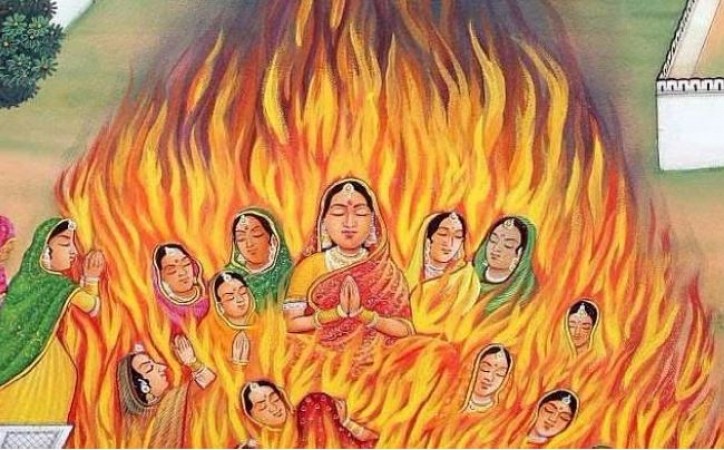
In the annals of history, stories of human suffering and bravery often intertwine, revealing the complexities of human nature and the depths of desperation. The practice of Jauhar, wherein Hindu women chose self-immolation over captivity and abuse, stands as a poignant testament to the horrors faced by these women during the times of invasion and conflict, particularly at the hands of the Mughals.
Historical Context: The Dark Era of Invasions
Throughout India's history, foreign invasions have scarred the nation's landscape, leaving behind tales of conquest, devastation, and untold suffering. The invasions by Mughal rulers marked one such dark era, where the lives of countless women were marred by the brutality and violence that accompanied these conquests. The specter of rape and abuse haunted the minds of many, leading some to choose an agonizing end over an even more agonizing existence.
The Grim Choice: Jauhar
Jauhar was a practice born out of desperation and a grim sense of agency. Facing the impending capture of their cities and the brutalities that often accompanied it, Hindu women chose self-immolation as a means of retaining a semblance of control over their own bodies and destinies. The choice to embrace death through fire was seen as a preferable alternative to the inhumane horrors they feared.
Mughal Rule and the Vulnerability of Women
Under the Mughal rule, stories of horrific acts committed against women circulated widely. The harrowing accounts of Mughal soldiers desecrating the bodies of dead women underscored the extent of degradation these women faced. The concept that even dead bodies were not spared from violation added a layer of desperation to the already dire circumstances.
The Power of Choice and Agency
While it is essential to remember that not all women chose the path of Jauhar, for those who did, it was an act driven by a complex interplay of factors – fear, honor, agency, and the desire to escape a fate deemed worse than death. The choice to embrace self-immolation, however tragic, reflected the women's fierce determination to maintain their dignity even in the face of utter despair.
A Testament of Resilience and Sacrifice
The stories of Jauhar are a stark reminder of the resilience and sacrifice of women who endured unimaginable hardships during times of invasion. They were willing to embrace a painful end over a life of degradation, symbolizing their determination to defy the perpetrators of violence and retain their agency, even in their final moments.
Unveiling the Shadows of History
As we reflect on history, it's important to remember the stories of those who faced atrocities and made unimaginable choices. The practice of Jauhar reveals a dark chapter in India's past, one where women grappled with a harsh reality and responded with a heart-wrenching decision. Their sacrifices are a solemn reminder of the need to preserve the dignity and agency of individuals even in the most dire circumstances.
The legacy of Jauhar invites us to delve into the complexities of human behavior and the lengths to which people will go to maintain their autonomy in the face of oppression. It encourages us to confront the brutality of the past and recognize the power of collective memory to prevent the repetition of such horrors.
The practice of Jauhar, while heart-wrenching, serves as a poignant reminder of the trauma and suffering endured by women during a tumultuous period in India's history. It compels us to remember their stories, reflect on the choices they made, and acknowledge the resilience that allowed them to confront adversity on their own terms, even as they walked toward the flames that consumed them.
Echoes of Suffering: The Untold Story of India's Massive Holocaust
Comparing British Colonial Rule and Mughal Rule: Assessing Atrocities and Impact on India